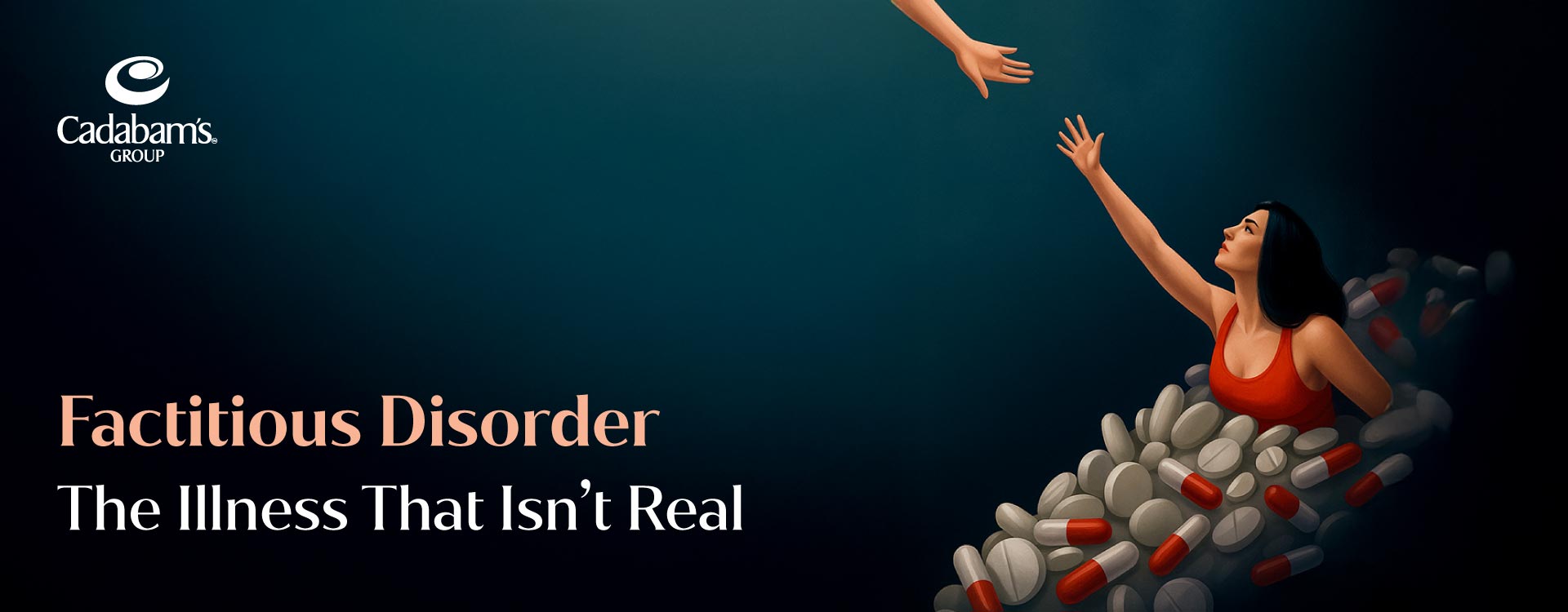Understanding the full scope of factitious disorder, from its symptoms and underlying causes to effective treatment options, is crucial for recognising and addressing this complex mental health condition. By gaining insight into how it manifests both physically and psychologically, we can better support those affected and guide them toward the appropriate care and recovery they need.
What is Factitious Disorder?
A fictitious disease is a rare but very debilitating mental illness in which people feign or fabricate symptoms of a disease to pretend to be patients.
A fictitious disorder, which stems from an internal psychological drive, is distinctly different from malingering, a scenario in which a person feigns symptoms to gain a financial or other advantage.
The deceptive behaviour is taken to the next level with a fictitious illness. Those affected are willing to undergo extreme measures such as invasive medical treatments to receive the desired medical treatment.
Understanding the condition is important for limiting the damage, creating appropriate intervention plans, making a correct diagnosis, and preventing harm.
Definition and Overview
In a factitious disorder, a person simulates, exaggerates or self-generates medical symptoms, which can lead to unnecessary treatment and hospitalisation.
People struggling with factitious disorder can engage in a range of behaviours, from self-harm to falsifying test results to appear ill.
Unlike other types of disorders, the said behaviour is not motivated by financial or personal gain.
Still, by the need to take on the ‘sick role’, Over the years, this disorder has been seriously misunderstood and misdiagnosed. Still, today, it is treated as a severe disorder by mental health experts.
Types of Factitious Disorder
Factitious disorder is categorised into two main types:
- Factitious Disorder Imposed on Self (FDIS): The individual fabricates or induces symptoms in themselves.
- Factitious Disorder Imposed on Another (FDIA): A caregiver, often a parent, induces illness in someone else, such as a child or dependent, to gain attention or sympathy.
Both forms of factitious disorder require early intervention to prevent severe physical and psychological harm.
FDIS – Creating or Exaggerating Symptoms for Attention
FDIS includes people who constantly fake or exaggerate symptoms, sometimes to the point of falsifying medical records, falsifying samples, or even undergoing dangerous medical procedures to convince doctors of their illness.
Underlying this condition is deep psychological distress, and most sufferers have experienced trauma or neglect.
FDIA – Munchausen Syndrome by Proxy- What It Is & How It Works.
FDIA, also known as Munchausen's syndrome, is a very serious abuse in which a carer causes or manufactures an illness in another person, usually a child or vulnerable adult, in order to attract attention or sympathy.
These are dangerous cases as the victim can suffer long-term physical and psychological damage, such as unnecessary surgery and lengthy hospitalisation.
Difference Between Factitious Disorder and Malingering
The difference between fictitious disorder and malingering can be confusing, but the main difference lies in the motivation:
- Factitious disorder is driven by an internal psychological need to assume the sick role, often with no tangible reward.
- Malingering is a deliberate act to achieve external benefits, such as avoiding work, obtaining financial compensation, or acquiring drugs.
While both conditions involve deception, factitious disorder is a psychiatric illness, whereas malingering is a behavioural choice.
Proper diagnosis through factitious disorder differential diagnosis is essential to ensure the correct intervention is provided.
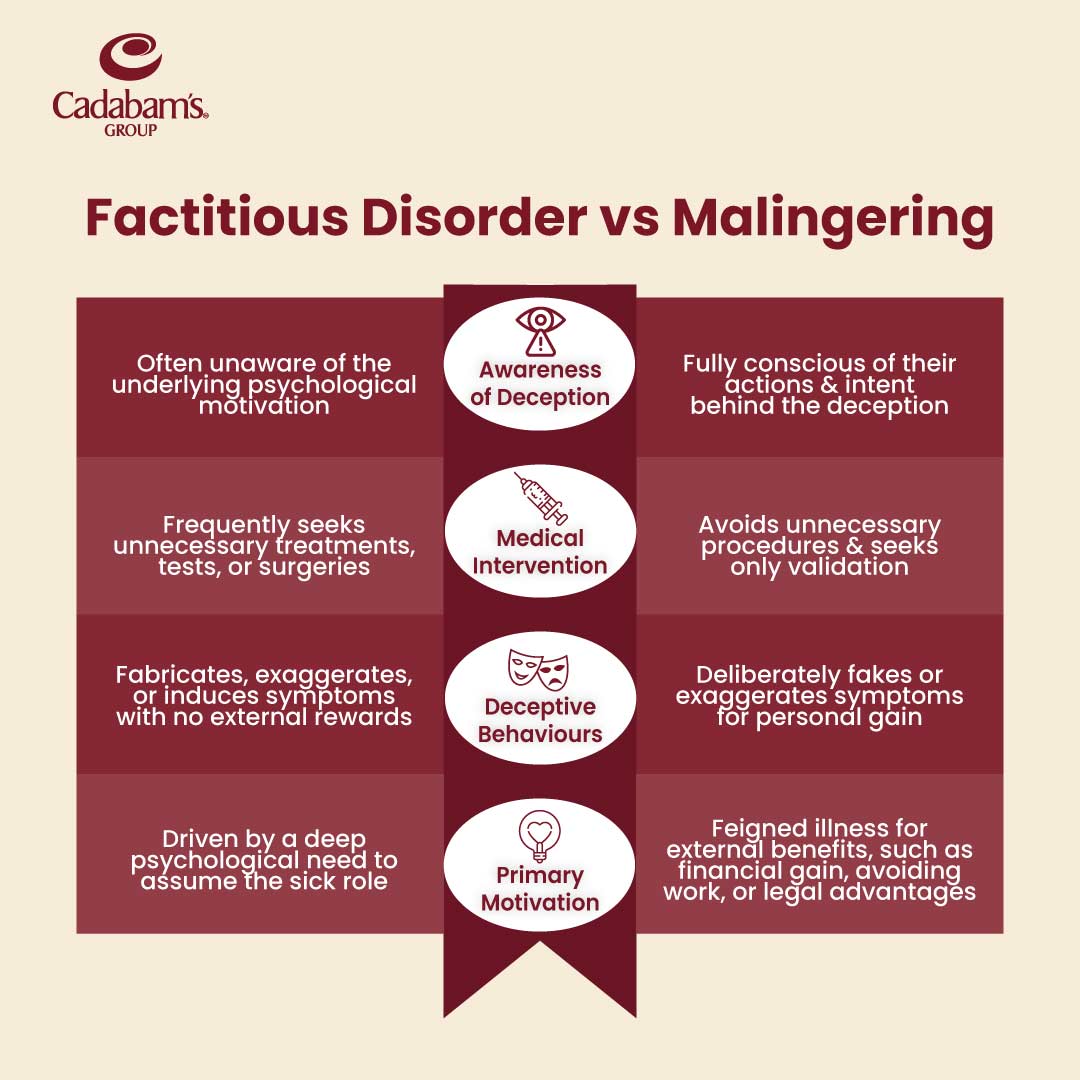
Psychology Behind Factitious Disorder
Factitious disorder is strongly rooted in psychological pain and is frequently necessitated by attention or validation seeking.
Knowing why people pretend to be ill facilitates the resolution of underlying emotional pain, especially unhealed childhood trauma and unfilled psychological needs.
Why Some People Fake Illnesses
Individuals with factitious disorder fabricate symptoms to assume the ‘sick role,’ seeking emotional support and care from medical professionals.
Their actions are not for financial gain but stem from deep-seated psychological struggles such as loneliness, low self-esteem, or unresolved trauma, and these are often cited as factitious disorder causes.
The Role of Childhood Trauma and Unmet Emotional Needs
Most cases of fictive disorder have their origins in childhood neglect, abuse or unreliable care.
The desire for medical care in later life usually stems from an unconscious desire to repeat early experiences of care or control over one's own world, making factitious disorder causes multi-layered and complex.
Symptoms of Factitious Disorder
The factitious disorder symptoms are both physical and psychological, which usually makes diagnosis difficult.
Sufferers may self-induce illness or exacerbate symptoms and present with an unusual familiarity with medical conditions.
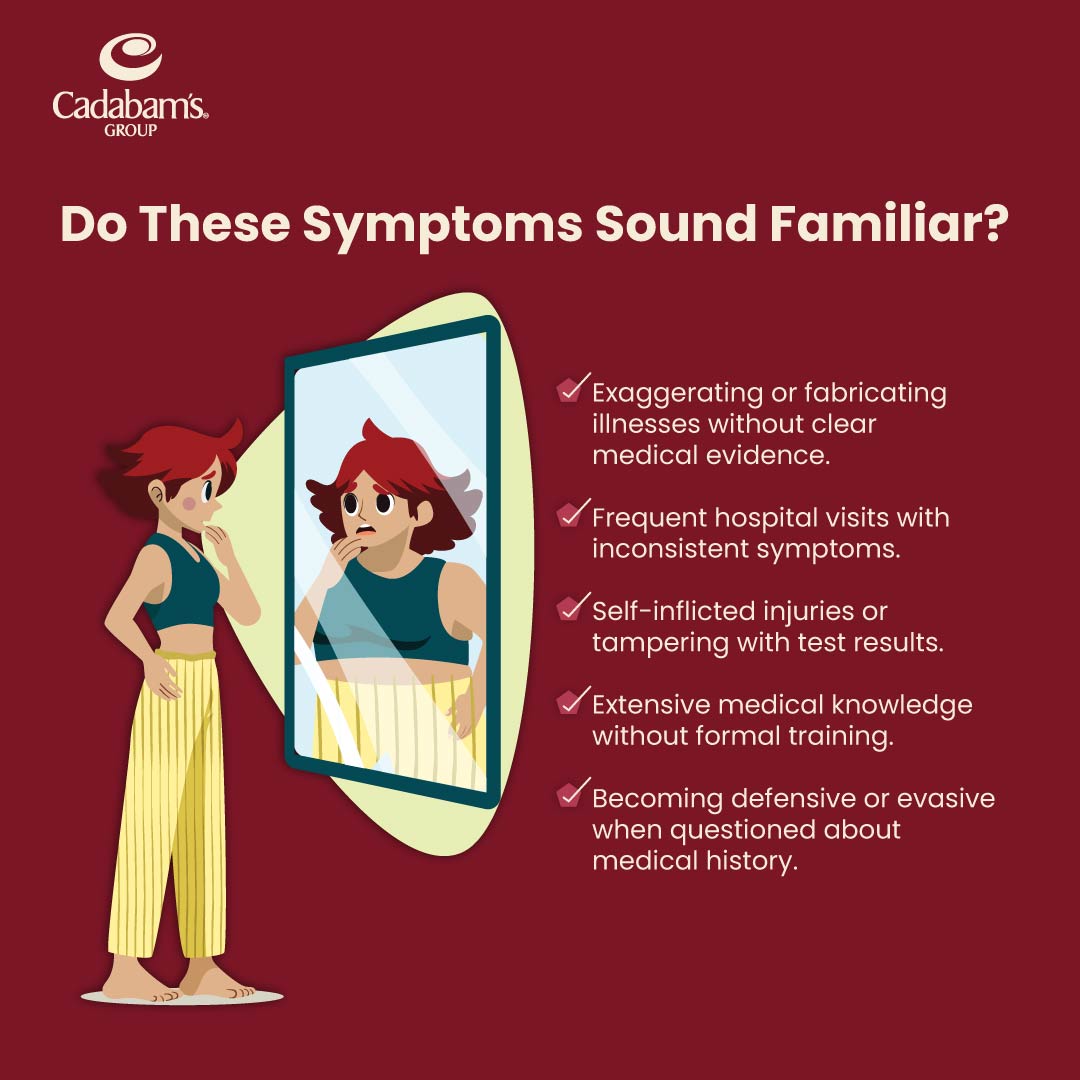
Physical Symptoms
Before diving into the details, it’s important to understand that the behaviours listed below are often driven by deep psychological needs, hallmark signs of factitious disorder symptoms.
- Self-Induced Symptoms: Deliberate poisoning, self-inflicted wounds, or repeated infections to convince doctors of a severe illness.
- Doctor Shopping: Visiting multiple medical facilities to avoid detection and receive unnecessary treatments or procedures.
- Manipulating Medical Tests: Tampering with lab results, contaminating test samples, or exaggerating symptoms to appear critically ill. These are hallmark factitious disorder symptoms.
Psychological Symptoms
These psychological patterns reflect more than just unusual behaviour, they are key indicators of factitious disorder symptoms that help experts identify the condition.
- Craving Attention from Medical Professionals: Constantly seeking reassurance and emotional validation from healthcare providers.
- Knowledge of Medical Terms & Conditions: Extensive understanding of diseases, often acquired through personal research or medical exposure.
- Becoming Defensive When Confronted: Reacting with anger, denial, or manipulation when questioned about inconsistencies in their symptoms.
Causes and Risk Factors
A fictitious disorder is caused by a complex interplay of psychological stress, early childhood experiences and environmental influences. People can develop this disorder due to previous trauma, a personality disorder or repeated medical exposure. These are among the key factitious disorder causes clinicians assess during evaluation.
In addition, social and digital platforms can contribute to reinforcing deceptive behaviours. Understanding these risk factors is crucial for early intervention and appropriate factitious disorder treatment.
Psychological Factors
Most people with a fictional disorder have experienced trauma, neglect or emotional deprivation in their childhood.
They may come from unstable backgrounds where illness was the only way to get attention.
Another group suffers from a comorbid borderline personality disorder, which exacerbates the need for control and affirmation.
The vulnerability in their psyche forces them to simulate or self-inflict wounds to satisfy the underlying emotional deficits.
Environmental and Social Factors
Early contact with a medical environment, regular hospitalisation or the idealisation of doctors may influence the development of a fictional disorder.
In addition, the portrayal of illness in social media and TV series may be a cause of the normalisation of exaggeration of symptoms.
Internet forums where people talk about fabricated illnesses can also reinforce such behaviours and create a pattern in which people with fictional disorders crave validation and sympathy for their false behaviour.
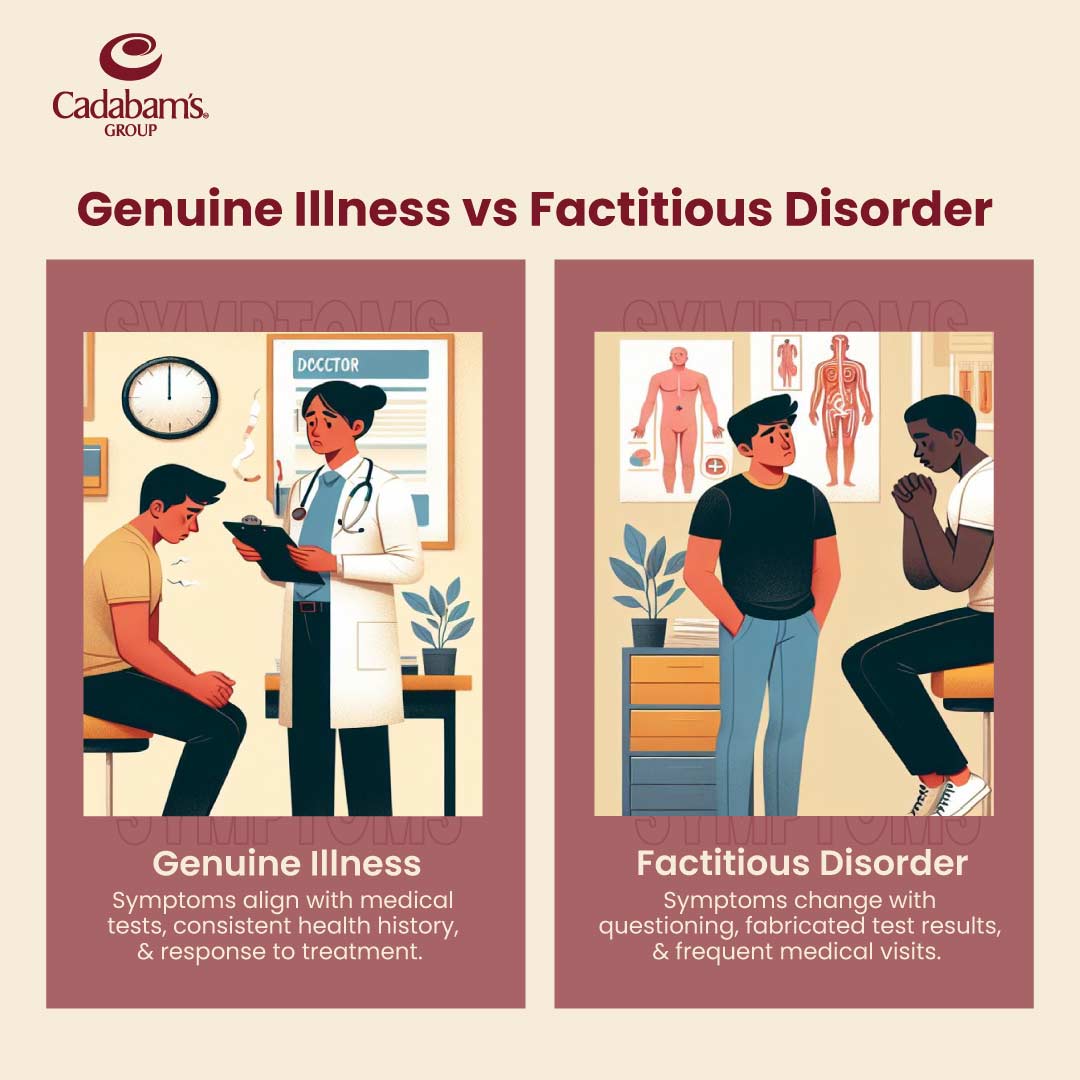
Diagnosis of Factitious Disorder
A fictitious disorder is difficult to diagnose because those affected deliberately mislead medical professionals.
The disorder is usually diagnosed based on discrepancies in medical history, multiple hospitalisations and symptoms that do not match objective medical data. A correct assessment is important to distinguish it from genuine illnesses, and determine an accurate factitious disorder definition.
Diagnostic Criteria
The DSM-5 criteria describe a factitious disorder definition as the intentional distortion of an illness in the absence of an external reward.
Diagnosis requires ascertaining a patient's medical history, identifying a pattern of exaggeration of symptoms, and recognising an underlying need for medical treatment.
The absence of physiological findings and multiple hospitalisations also reinforces the diagnosis of a fictitious disorder, so psychiatric assessment should be an integral part of the process.
Differentiating from Similar Disorders
Factitious disorder must be distinguished from malingering and somatic symptom disorders.
Psychological testing, behavioural analysis, and reviewing past medical records help differentiate cases.
Unlike malingering, where symptoms are fabricated for tangible gain, individuals with factitious disorder seek emotional validation.
Clinicians rely on inconsistencies in reported symptoms and behavioural cues to confirm the diagnosis.
Treatment Options
Managing factitious disorder requires a combination of psychotherapy, medication (in specific cases), and strong support systems.
Therapy aims to address the underlying psychological distress, while medication is only prescribed for co-existing mental health conditions.
Family involvement and peer support are essential in reducing dependency on medical attention.
Since individuals with this disorder often resist treatment, a compassionate and structured approach is necessary to ensure long-term improvement.
Psychotherapy
Cognitive behavioural therapy (CBT) is the treatment of choice for a fictive disorder, as it helps those affected to recognise and change maladaptive thought patterns.
Dialectical Behaviour Therapy (DBT) is also helpful in improving emotional control, reducing impulsive drug-seeking behaviour and treating underlying trauma.
Therapy sessions focus on fostering self-awareness, teaching coping mechanisms, and promoting healthier interpersonal relationships.
While challenging, long-term engagement in psychotherapy significantly improves emotional stability and reduces the compulsion to fabricate medical symptoms.
Medication
There are no known medications for an invented disorder, but antidepressants and anti-anxiety medications can be used to treat co-occurring conditions such as depression or anxiety.
Medication in itself is not a good cure; it must be accompanied by therapy. Medication should not be used excessively so as not to reinforce the patient's behaviour.
Support Systems & Rehabilitation
Strong support systems play a crucial role in recovery. Family therapy helps loved ones understand the disorder and respond appropriately, while caregiver education reduces enabling behaviours.
Group therapies and peer support programmes provide a safe environment where people can share experiences and learn healthier ways of coping. Encouraging structured, non-medical contact facilitates long-term stability and emotional health.
Challenges in Managing Factitious Disorder
The treatment of a hypothetical disorder is difficult due to the self-harming and dishonest behaviour of the person concerned.
A decisive and methodical approach raises ethical issues, as safety must be maintained.
Weighing up the options avoids overburdening the patient, which exacerbates the problem and complicates factitious disorder treatment.
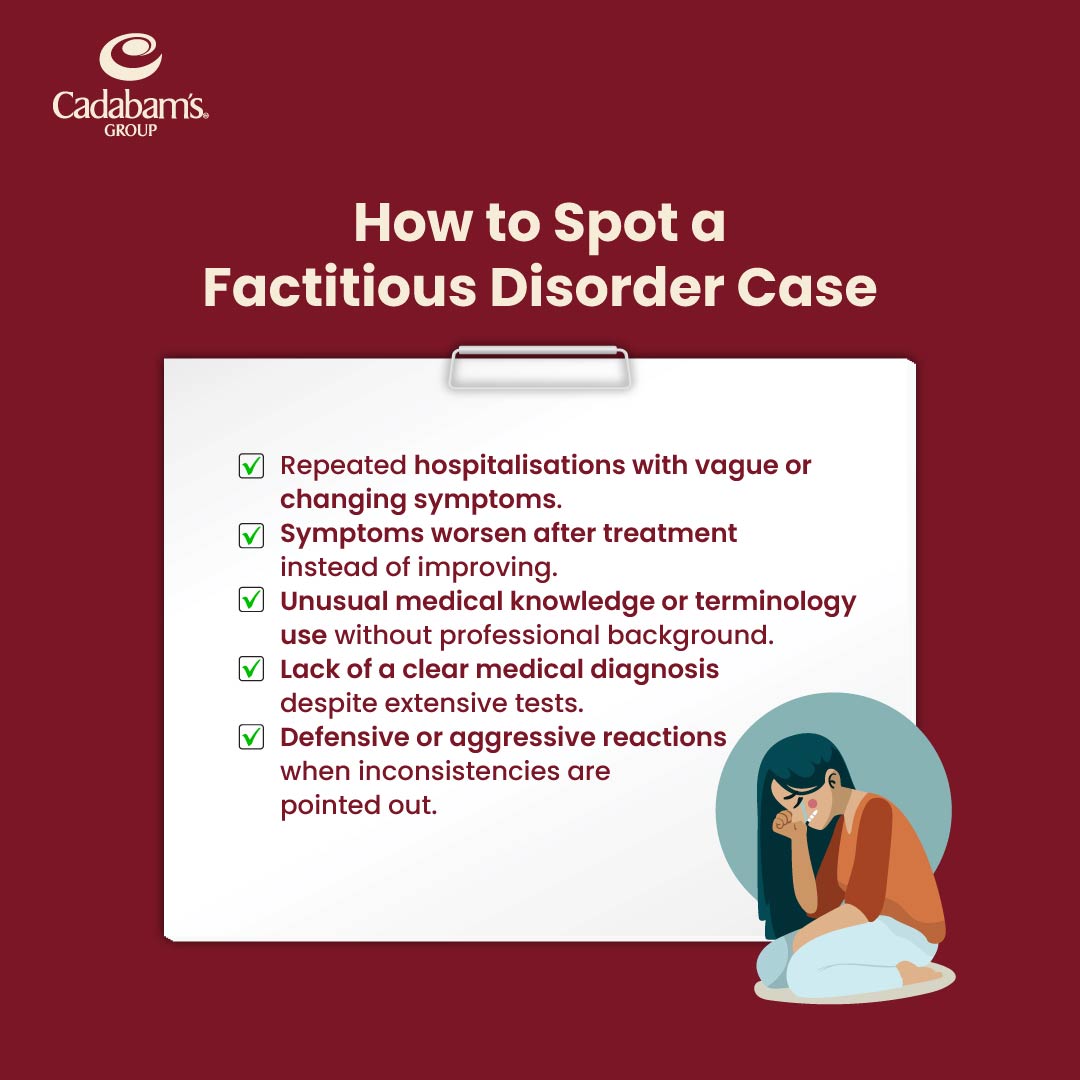
Ethical and Legal Considerations
Healthcare professionals have to deal with complex ethical dilemmas when treating a fictional disorder without jeopardising patients' autonomy at the expense of their health.
Legal issues arise when a person simulates symptoms that lead to avoidable medical treatment and overuse of resources.
Impact on Healthcare Providers
The fictional disorder has a major impact on healthcare providers due to misdiagnosis, additional hospitalisation costs and emotional burnout.
It is crucial to recognise the patterns of manipulative behaviour and not lose professional sympathy in the process.
Multidisciplinary and collaborative approaches help to reduce avoidable interventions while prioritising the patient's well-being.
Supporting Individuals with Factitious Disorder
Family, friends and organised therapy play a central role in recovery.
Creating an empathetic, non-judgemental environment reduces dependence on fabricated illnesses, and professional help ensures successful long-term control.
Role of Family and Friends
The families of people with a fictional illness usually experience emotional pain and frustration.
It is important to set healthy boundaries, support professional treatment and not engage in supportive behaviour.
Education and family therapy can provide coping skills and a supportive, recovery-oriented environment.
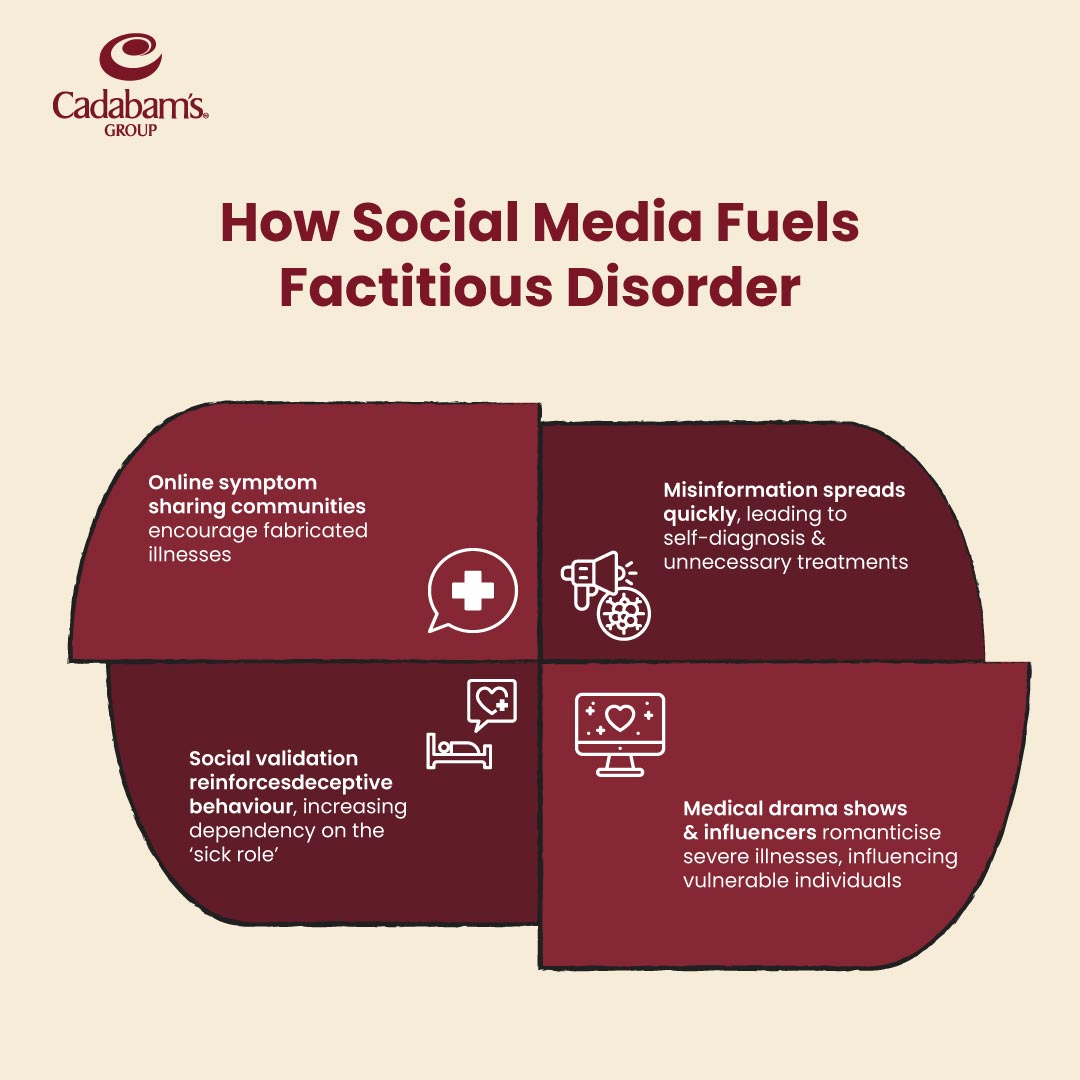
Accessing Support Groups and Resources
Support groups and educational materials help individuals and families with a fictional disorder.
Contact with mental health services, peer networks and caregiver support groups provides emotional support, practical techniques and access to specialised treatment programmes.

Why Choose Cadabam’s for Managing Factitious Disorder
At Cadabam's, we provide specialised, evidence-based treatment for factitious disorder that is compassionate and organised.
Our multidisciplinary team provides therapy, family counselling, and individual recovery plans to help sufferers take back control of their lives.
If you are searching for a solution to your problem, Cadabam’s Rehabilitation Centre can help you with its team of specialised experts. We have been helping thousands of people live healthier and happier lives for 30+ years. We leverage evidence-based approaches and holistic treatment methods to help individuals effectively manage their factitious disorder. Get in touch with us today. Call now to get expert help and begin the healing process. You can call us at +91 96111 94949.
FAQs
How is factitious disorder diagnosed?
The diagnosis includes psychological assessments, analysis of the medical history and behavioural observations. Physicians assess inconsistencies in symptoms and unnecessary medical interventions, often using the DSM-5 criteria.
What are the symptoms of factitious disorder?
Factitious disorder symptoms include exaggerating or faking illnesses, self-inflicted harm, doctor shopping, and excessive medical knowledge without a formal diagnosis.
What are the treatment options for factitious disorder?
Treatment includes psychotherapy (CBT, DBT), family therapy, and structured support systems to manage compulsive symptom fabrication.
Can factitious disorder be cured?
There is no definitive cure, but long-term therapy, behavioural interventions, and family support can significantly improve quality of life.
How to deal with a family member with factitious disorder?
Encourage professional treatment, set healthy boundaries, and avoid reinforcing deceptive behaviours while maintaining emotional support.
.webp)
